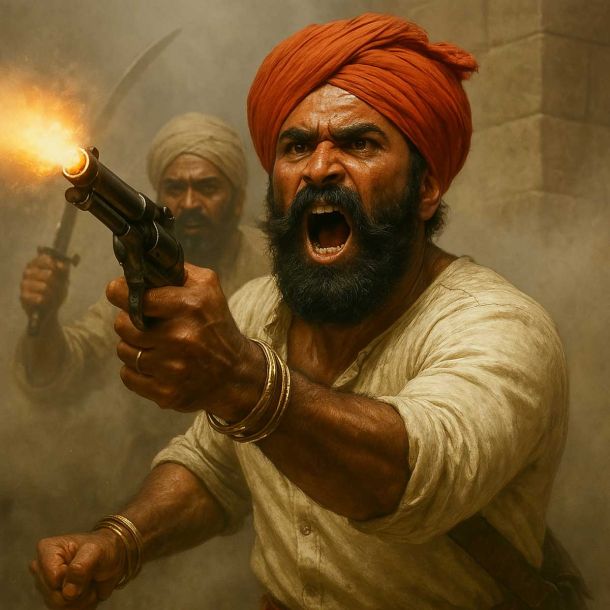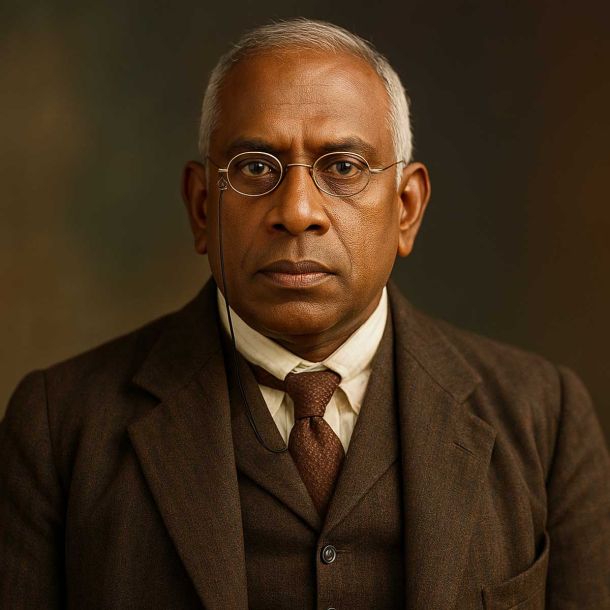MORE COVERAGE
A Pilgrim to the Soviet Paradise - Genesis and Growth of Nehruism Vol 1
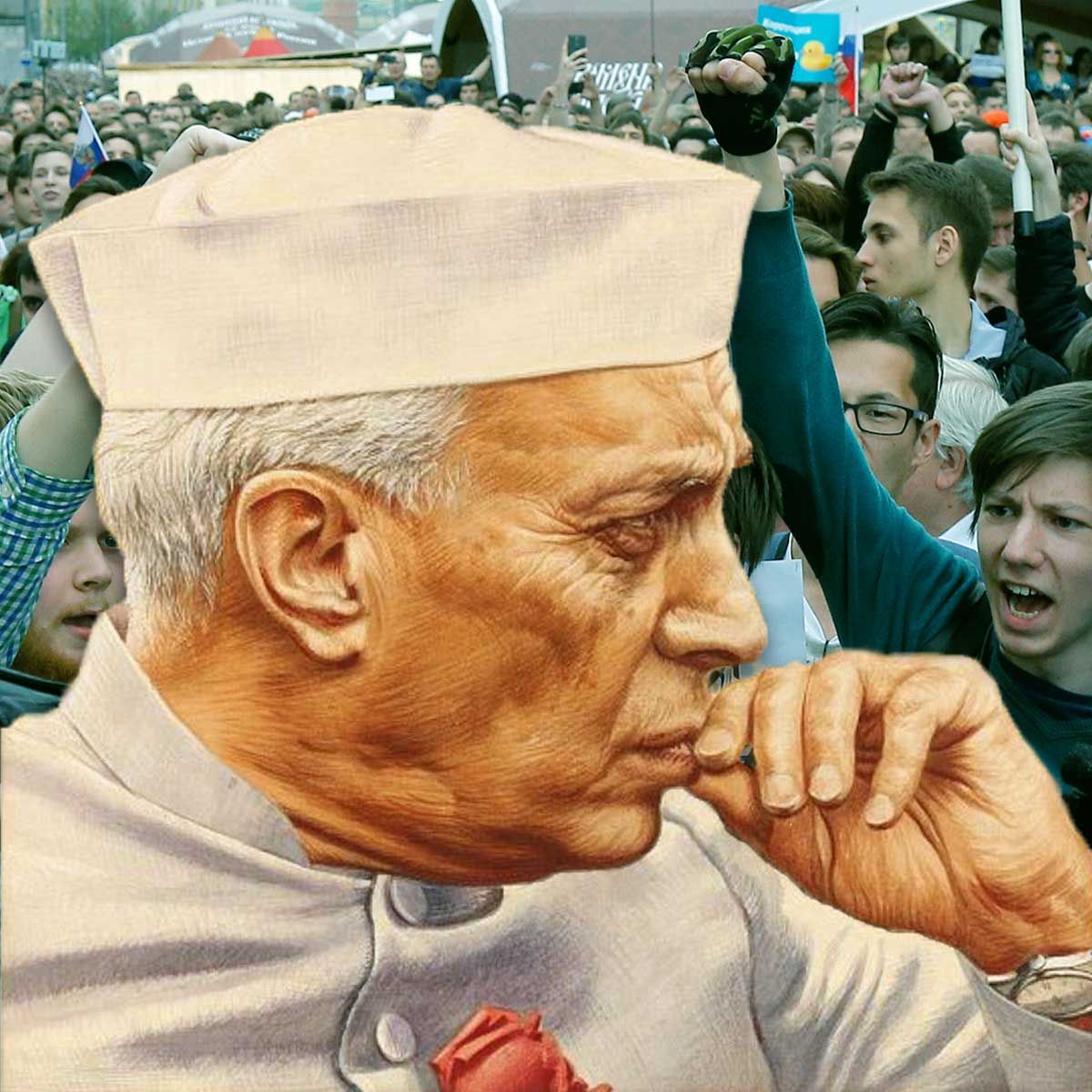
The first job is to find out how Pandit Nehru has looked at the Soviet Union and the creed of Communism all through these years. For purposes of this investigation, we have chosen five basic books written by him, namely Soviet Russia (1929), Glimpses of World History (1934), An Autobiography (1936), Unity of India (1941), and Discovery of India (1946). All these books, except the first and the fourth, have been reprinted many times and still constitute the basic reading for anyone who wants to understand Pandit Nehru. We shall take these books one by one.
The book Soviet Russia: Some Random Sketches And Impressions was compiled from a series of articles that Pandit Nehru wrote in various Indian newspapers after his return from a visit to Moscow in November 1927.1 A reprint of this book was brought out in 1949 and is even now recommended as well as readily made available by communist bookshops. I have myself seen translations of this book in several Indian languages brought out by communist publishing houses as late as 1954. So far as I know, Pandit Nehru has never withdrawn, or disclaimed, or dated this book. We can, therefore, conclude that he still regards as valid the views he expressed in it.
He had spent altogether three or four days in Soviet Russia and that too in Moscow. But in his book, he expresses very definite opinions about every important aspect of what he eulogizes as "the Soviet Experiment". No one familiar with the torrent of books written by communists and fellow travelers after brief visits to this or that communist country can fail to see that while writing this book Pandit Nehru had depended entirely upon official Soviet handouts that were heaped upon him while he was in Moscow. He added to this official version the version of various "progressive" writers from outside the Soviet Union.
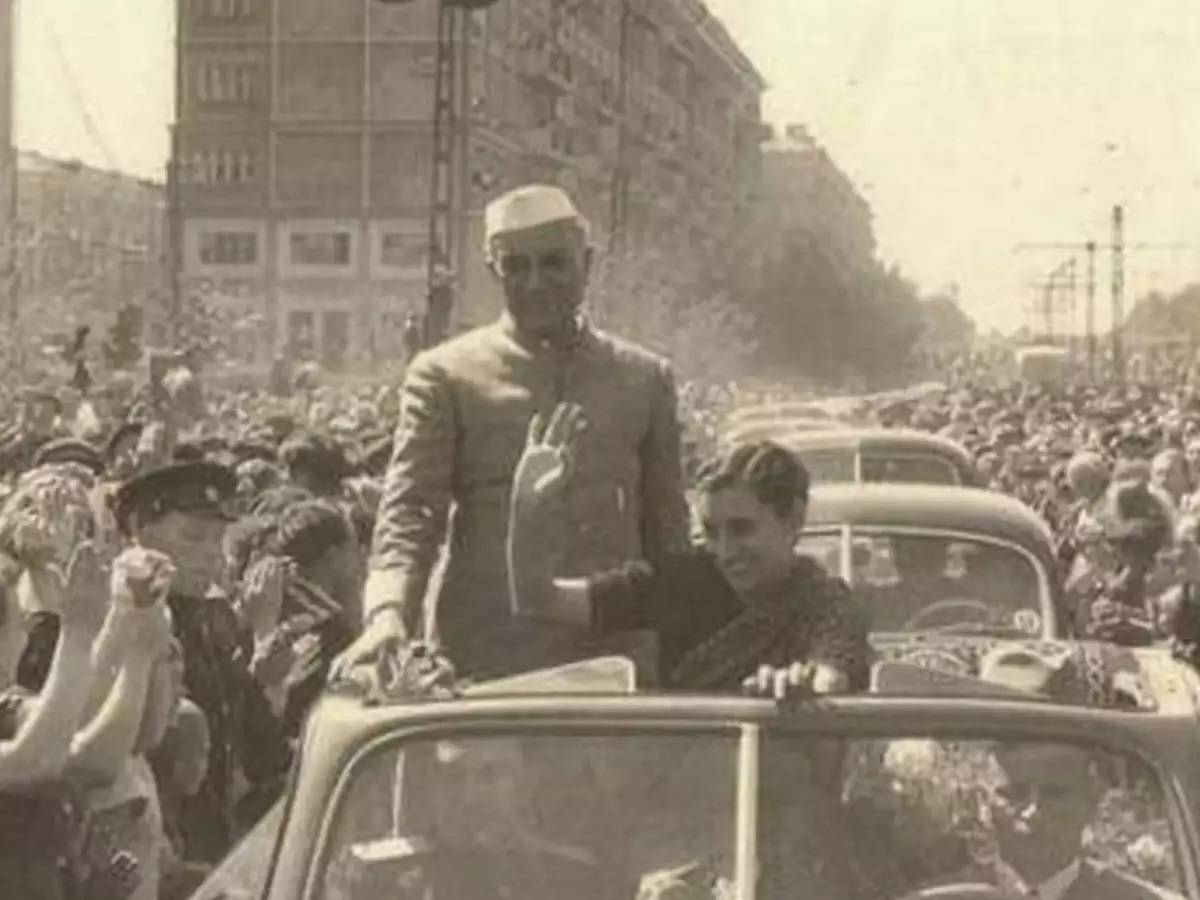 Nehru's Soviet trip was from June 7 till June 23, 1955, and his daughter Indira Gandhi had accompanied him |
The book opens with a chapter "Fascination of Russia". Russia, he says, is "a country which has many points of contact with ours and which has launched one of the mightiest experiments in history. All the world is watching her, some with fear and hatred, and others with a passionate hope and longing to follow in her path." Then identifying himself with the second group, he theorizes. "Much depends on the prejudices and preconceived notions which he brings to his task. But whichever view may be right, no one can deny the fascination of this strange Eurasian country of the hammer and sickle, where workers and peasants sit on the thrones of the mighty and upset the best-laid schemes of mice and men."2
Again: "For us in India, the fascination is even greater, and even our self-interest compels us to understand the vast forces which have upset the old order of things and brought a new world into existence, where values have changed utterly and old standards have given place to new. We are a conservative people, not ever-fond of change, always trying to forget our present misery and degradation in vague fancies of our glorious past and immortal civilization. But the past is dead and gone and our immortal civilization does not help us greatly in solving the problems of today."3
And again: "Russia thus interests us because it may help us to find some solution for the great problems which face the world today. It interests us especially because conditions there have not been, and are not even now, very dissimilar to conditions in India. Both are vast agricultural countries with only the beginnings of industrialization, and both have to face poverty and illiteracy. If Russia finds a satisfactory solution for these, our work in India is made easier."4
Then he bursts out against non-communist news agencies which, in his opinion, are preventing India from knowing the truth about the Soviet Union. He says: "It is right therefore that India should be eager to learn more about Russia. So far her information has been largely derived from subsidized news agencies inimical to Russia, and the most fantastic stories about her have been circulated."5 Comrade Khrushchev, however, informed us in 1956 that it was not these news agencies but communist propagandists like Pandit Nehru who had been telling the most fantastic stories about Stalin's Soviet Russia.
Before entering the Soviet Union, Pandit Nehru had to pass through Poland which had committed the "crime" of being anti-communist because she had been invaded by the Red Army in 1920 and had freed herself only after a grim struggle. He writes: "We went from Berlin and crossed the whole of Poland. It was an uneventful and dreary journey. Poland looked like a desolate and dismal country. Except for Warsaw, the stations were small wayside buildings with very few houses in the neighborhood. It may be, however, that the cheerless aspect of the country was due to the season; it was the beginning of winter. But even winter could not have made much difference to an industrial country and from what we could see from the train there were few pieces of evidence of industrialism."6
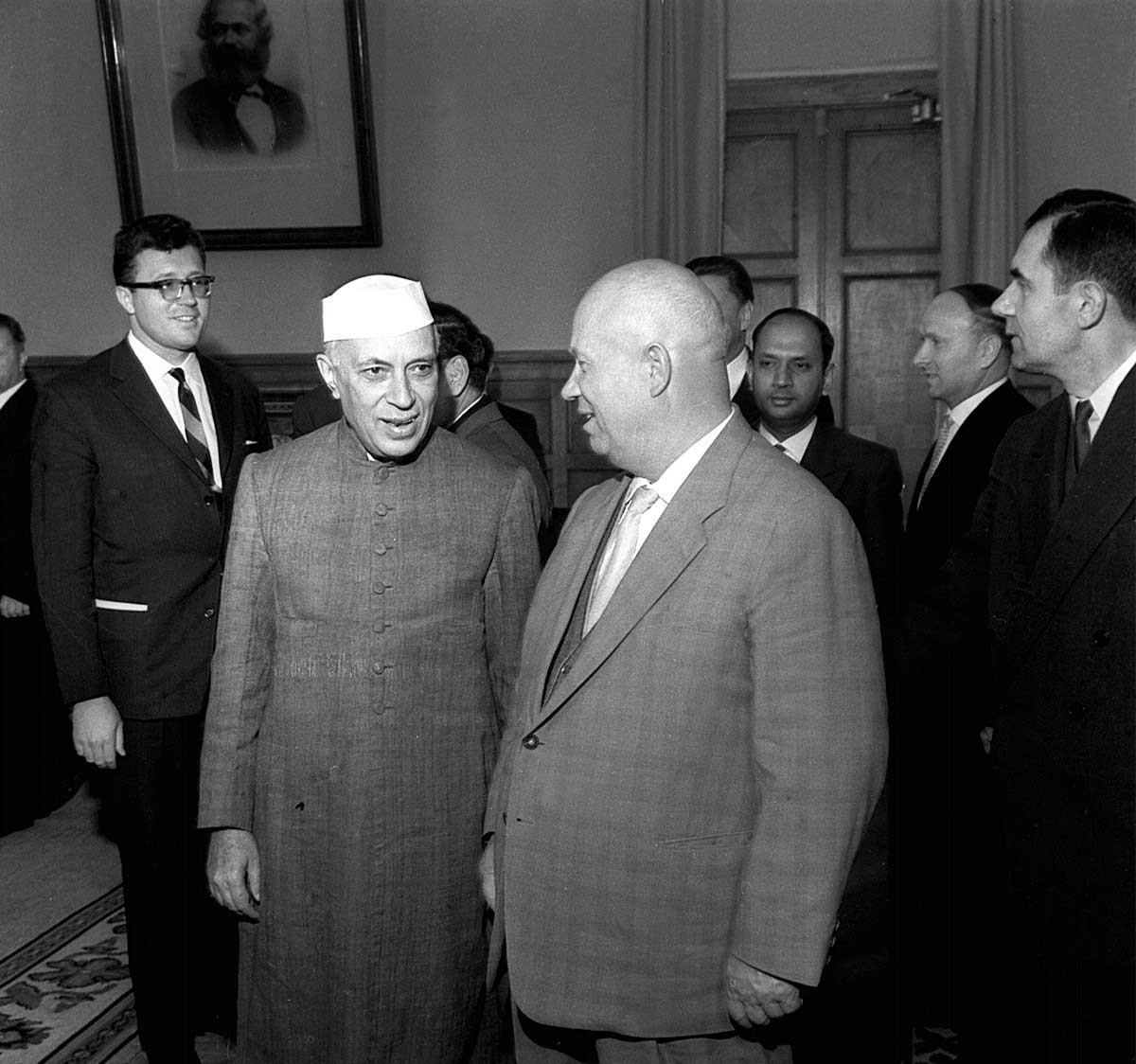 Nehru and Khrushchev. Vasily Yegorov/TASS |
Soviet Russia too had hardly any industries worth the name at that time. But that did not diminish his enthusiasm. He tells us the reason: "We had already taken our dinner but the station staff produced large quantities of food and, after the Indian fashion, would have no refusal. We had to comply with their wishes .... Our berths had been reserved by our hosts and we had a very comfortable journey. There is only one class in Russia but they have some special sleeping cars and we had been provided with these. We traveled the whole night and the greater part of the next day, arriving in Moscow the next afternoon. All the stations en route were decorated with flags and pictures in honor of the anniversary. The men and women and children we saw at the stations were well-clad and most of them had great coats reaching to their ankles and big Russian boots up to the knees."7 In exchange for this wining, dining, and welcome, he could very well forgive Soviet Russia for not having any industries.
But he arrived late. The big tamasha in the Red Square of Moscow was already over. So he weeps: "Our first feeling was of great regret that we had not come a day or two earlier. The real anniversary celebration had taken place the day before and we had missed it... Effigies there were of Chamberlain and Briand and Baldwin, some of them very clever. One of these showed Chamberlain wedged in a sickle with the hammer falling on his head... Such were the accounts that we heard, and the more we heard them the more we regretted having missed this magnificent spectacle."8
From all accounts the poverty in Russia at that time was appalling. But he has always been able to find a justification for every shortcoming in the Soviet Union. He rationalizes: "Generally the goods displayed in the shops were simple and modest and had no pretensions to fashion or smartness. There were none of the dainties of the Rue de Rivoli or Bond Street. People in the streets and indeed everywhere were clad regardless of fashion, many without collars or ties. Many of them of course could not afford to buy anything expensive. But apart from the question of expense, it was considered a bourgeois failing to waste time and money on others."9 It did not occur to him that even if the people in Moscow had become prepared to "waste time and money" on clothes, there were no clothes which they could buy. If he had tried to sell his old garments in Moscow at that time, he could have easily obtained a fabulous price. Many others did, and the Muscovites not only paid but were also extremely thankful. The Bolsheviks had completely disrupted Russia's economy and there was an all-around shortage of consumer goods.
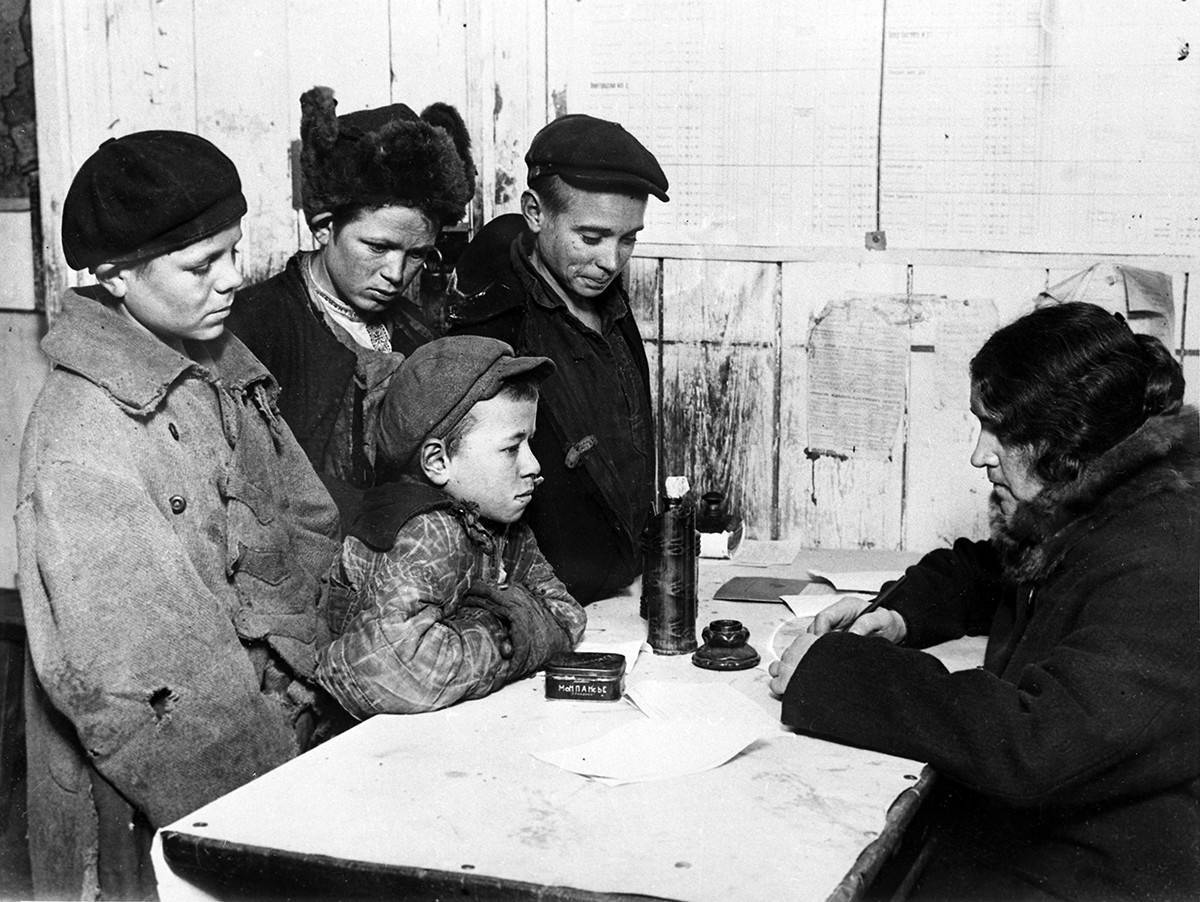 Registration of homeless children in 1928 |
He visited Lenin's mummy in Moscow. This new avatar of Chingiz Khan, who was responsible for seven million deaths in Russia, bewitched him completely. He writes: "He lies asleep as it were and it is difficult to believe that he is dead. In life, they say he was not beautiful to look at. He had too much of common clay in him and about him was the 'smell of the Russian soil'. But in death, there is a strange beauty and his brow is peaceful and unclouded. On his lips there hovers a smile and there is a suggestion of pugnacity, of work done and success achieved. He has a uniform on and one of his hands is lightly clenched. Even in death, he is the dictator. In India, he would certainly have been canonized, but saints are not held in repute in Soviet circles, and the people of Russia have done him the higher honor of loving him as one of themselves."10 Knowing nothing about India at that time, or ever since for that matter, he alone could believe that the Indian people would have hailed as a saint a mass-murderer like Lenin.
Not only that. Thinking of Lenin and his deeds, he becomes bitter about his own Congress Party in India. He complains: "It is difficult for most of us to think of our ideals and our theories in terms of reality. We have talked and written about Swaraj for years, but when Swaraj comes it will probably take us by surprise. We have passed the independence resolution at the Congress, and yet how many of us realize its full implications? How many belie it by their words and actions? For them, it is something to be considered as a distant goal, not as a thing of today or tomorrow. They talk of Swaraj and independence in their councils but their minds are full of reservations and their acts are feeble and halting."11 He was looking around in India for a similar spectacle as had drowned Russia in rivers of innocent blood during 1917-21.
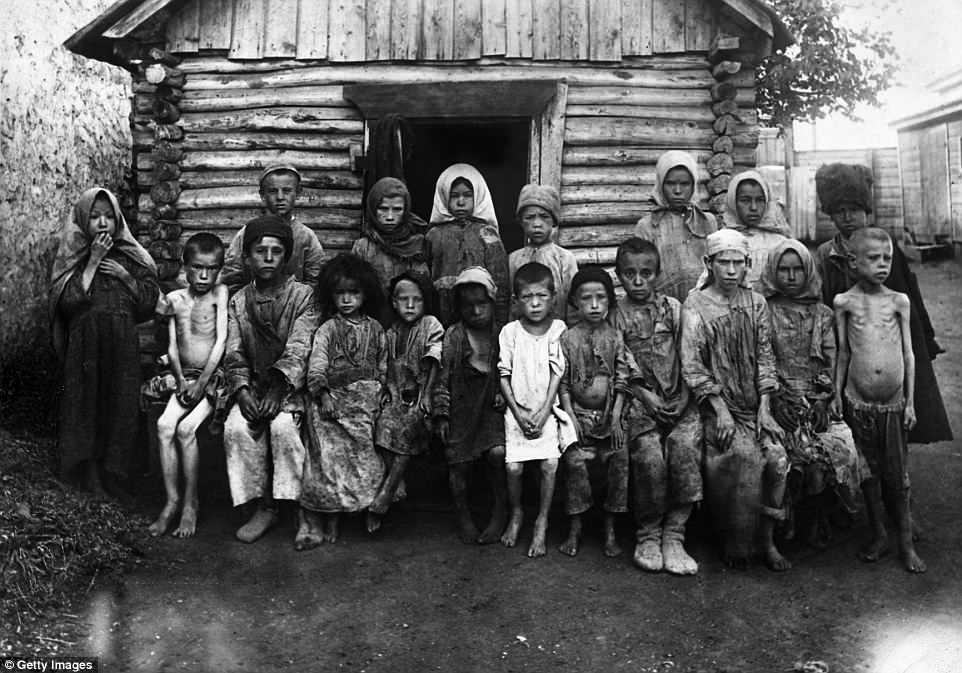 Human heads sold at the market stall for cannibals: Haunting images show Russian peasants selling body parts during the 1920s famine that forced families to eat their relatives |
This self-appointed leader of the peasantry in the UP was angry with the Russian peasants because, at that time, they were resisting the Bolshevik bandits from depriving them of their land and whatever meager amounts of grain they had managed to save and hide. Repeating the most mendacious communist lies against "counterrevolutionary Kulaks", he writes: "The city proletariats of Leningrad and Moscow were the spear-heads of the revolution and the peasantry was for some time poorly represented in the soviets. Immediate advantage, however, was taken by the peasantry of the Soviet decree to nationalize land, and even without the intervention of the central authority they ejected the landlords and divided the land amongst themselves. Having done so the more prosperous of them was content and had no desire for further change or more revolution. Many of them knew little about communism and cared less, and gradually they developed hostility to the Soviet power which did not view with favor the hoarding of corn and the profiteering in which the richer peasantry was indulging."12
It was, however, the criminal law and prison administration of Soviet Russia which simply bewitched him. He enthuses: "Nothing is perhaps more confusing to the student of Russia than the conflicting reports that come of the treatment of prisoners and the criminal law. We are told of the Red Terror and ghastly and horrible details are provided for our consumption; we are also told that the Russian prison is an ideal residence where anyone can live in comfort and ease and with a minimum of restraint. Our visit to the chief prison in Moscow created a most favorable impression on our minds."13
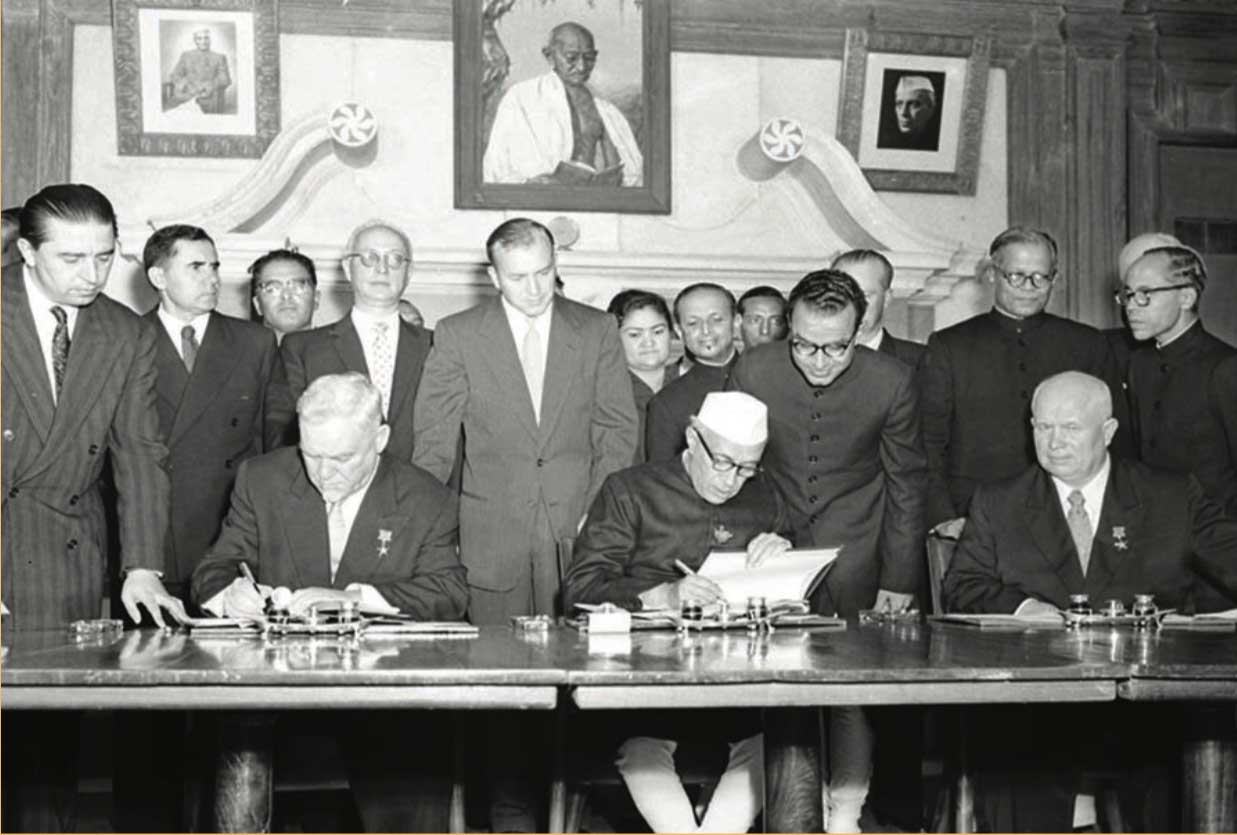 Prime Minister, Shri Jawaharlal Nehru, and Mr. Nikolai Bulganin signed an agreement in the presence of distinguished diplomats in New Delhi. Mr. Nikita Khrushchev is on the extreme right (sitting). December 13, 1955 |
Again: "As we were very much pressed for time we were unable to see as much of the jail as we wanted to. We had an impression that we had been shown the brighter side of jail life. Nonetheless, two facts stood out. One was that we had seen desirable and radical improvements over the old system prevailing even now in most countries and the second and even more important fact was the mentality of the prison officials, and presumably the higher officials of the government also, regarding jails. Actual conditions may or may not be good but the general principles laid down for jails are certainly far in advance of anything we had known elsewhere in practice. Anyone with a knowledge of prisons in India and of the barbarous way in which handcuffs, fetters, and other punishments are used will appreciate the difference. The governor of the prison in Moscow who took us around was all the time laying stress on the human side of jail life, and how they endeavored to keep this in the front and not to make the prisoner feel in any way dehumanized or outcasted. I wish we in India would remember this wholesome principle and practice it in our daily lives even outside jail... It can be said without a shadow of a doubt that to be in a Russian prison is far more preferable than to be a worker in an Indian factory, whose lot is 10 to 11 hours work a day and then to live in a crowded and dark and airless tenement, hardly fit for an animal. The mere fact that there are some prisons like the ones we saw is in itself something for the Soviet Government to be proud of."14
One wishes that the British Government of India had adopted the Soviet system of criminal law and prison administration, at least so far as Pandit Nehru was concerned. In that event, he would not have had the opportunity to write the voluminous amounts of abominable nonsense he did in later years while serving short sentences in the cool comfort of Dehra Dun District Jail. No one has yet heard of a book written by a prisoner in a Soviet jail. Even most of the prisoners have never been heard of once they went behind the bars in the Soviet Union. In any case, we have first-hand accounts of conditions in Soviet jails from the few who were fortunate enough to come out... They tell a different and dismal story.
He is not sure that his account of the Soviet Union is sufficiently convincing. He knows that the truth about the Bolshevik butchers has leaked out into the wide world. So he recommends to his readers larger doses of the dope which has paralyzed his mind. He writes: "I remember attending a banquet given by the scientists and professors in Moscow. There were people from many countries present and speeches in a variety of languages were made. I remember especially a speech given by a young student who had come from far off Uruguay in South America .... He spoke in the beautiful sonorous periods of the Spanish language and he told us that he was going back to his distant country with the red star of Soviet Russia engraved in his heart and carrying the message of social freedom to his young comrades in Uruguay. Such was the reaction of Soviet Russia on his young and generous heart. And yet many tell us that Russia is a land of anarchy and misery and the Bolsheviks are assassins and murderers who have cast themselves outside the pale of human society."15
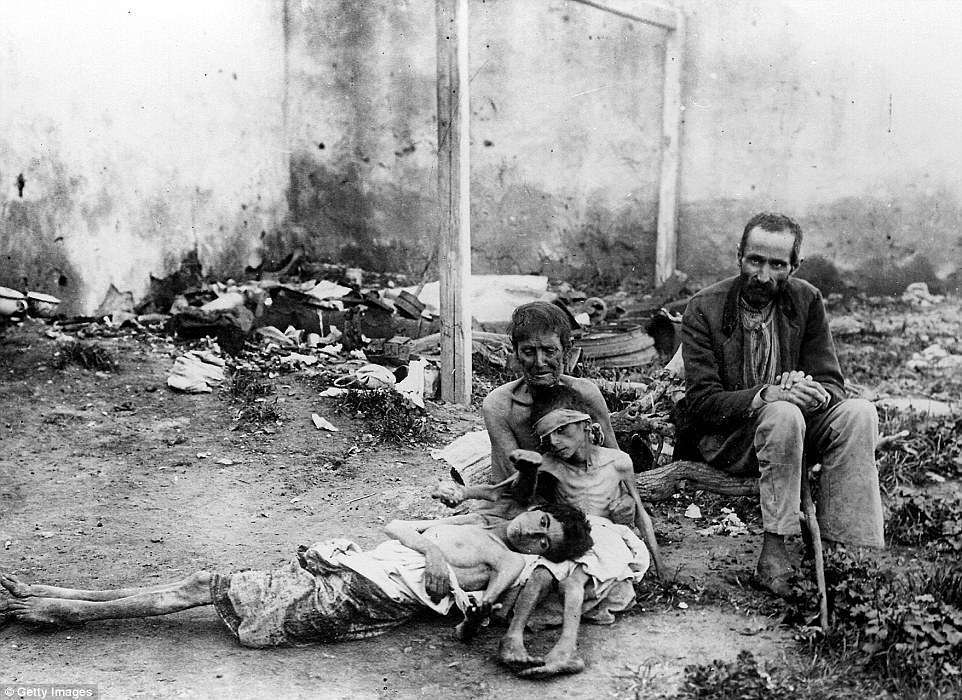 A couple with their starving children during a famine in the U.S.S.R., circa 1922 |
He wants his readers not to bother about communist theory while contemplating communist creations in Soviet Russia. According to him: "But to understand the great drama of the Russian Revolution and the inner forces that shaped and brought the great change about, a study of cold theory is of little use. The October Revolution was undoubtedly one of the great events of world history, the greatest since the first French Revolution, and its story is more absorbing, from the human and the dramatic point of view, than any We or phantasy."16 A critique of Soviet Russia in terms of what Marx or even Lenin had promised after the proletarian revolution is likely to be too disturbing. So he says: to hell with the theory of Communism! But, later on, when he is faced with the ugliness of Soviet Russia in too overwhelming a manner, he will ask his readers to forget the reality on the ground, and contemplate the promise which communist theory holds for mankind!
He recommends that his readers should read Ten Days That Shook The World which the American communist, John Reed, had written in 1920 and which was, incidentally, for some time an officially prescribed textbook for children in Soviet schools. Reviewing this propaganda book, he says: "And as one reads, with horror and pain at times, the wonder grows that such a miracle could have happened and succeeded. And above all there is admiration for the group of men who did not flinch at the mightiest of obstacles, and, amid war and rebellion, with a cruel death and disaster continually facing them, set down to evolve a socialist order out of the chaos that surrounded them. They had time even on the fourth day of the revolution, with firing going on in the streets, to establish the eight-hour day for the workers and formulate their policy for a system of popular education. Within a week they had tackled the problem of minorities, which like the poor is always with us in India."17
Prof. Anton Karlgren's book, Bolshevik Russia, is, in his opinion, "patently and-Bolshevik propaganda"18. But he recommended a book which he has not read! "A recent book," he writes, "well recommended but which I have not read, is Maurice Dobb's Russian Economic Development Since the Revolution (Routledge). Dobb is an eminent economist with considerable sympathy for the basic ideas of the revolution, but withal critical and scientific."19 He forgets to tell his readers that Maurice Dobb is a communist.
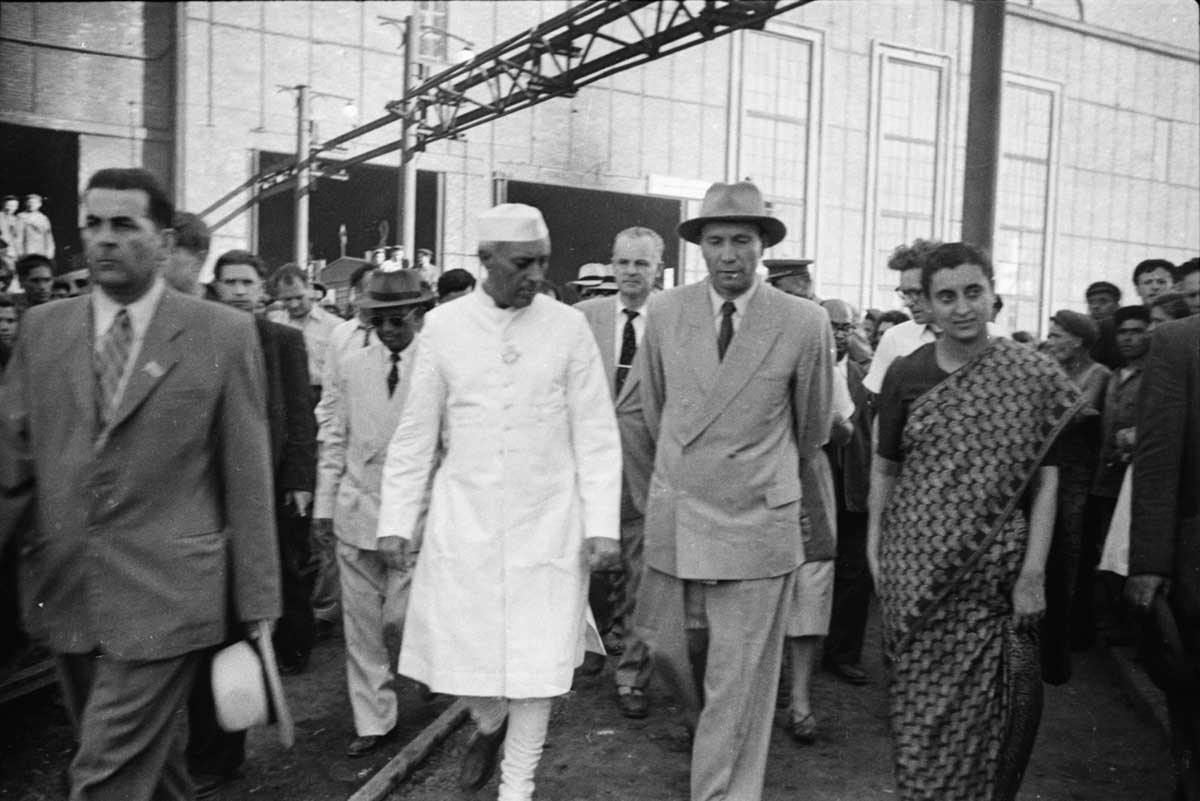 Jawaharlal Nehru and Indira Gandhi at the Rustavi Metallurgical Plant in 1955 (Rustavi, Georgia USSR) |
Or, better still people could read Soviet Russia Today. "It is frankly a report of the friends of Russia but is nonetheless valuable and full of information. It is signed by 92 representatives of workers' organizations in England and Scotland and no such document however partisan it may be can be lightly treated. It is only not very critical and is full of enthusiasm for what they saw ... That Russia should produce such a reaction on representative hard-headed workers is itself a significant fact. It gives us a glimpse of how the Russian Revolution is creeping into the hearts of workers in different countries and Moscow is becoming the Mecca of the proletariat. Soviet Russia by translating their dreams into reality has given them new hope and new courage."20 He does not know or tell us that these "hard-headed workers" were picked up and quite often paid by the worldwide communist network for saying precisely the things they said.
Thus whatever the facts, his conclusions are the same. He is out to sell Soviet Russia to his countrymen.
Footnotes:
- Jawaharlal Nehru, Soviet Russia: Some Random Sketches and Impressions, reprinted by Chetana, Bombay, 1949, p.1
- Ibid., p.2
- Ibid
- Ibid., p.3
- Ibid., pp. 3-4
- Ibid., pp. 6-7
- Ibid., pp. 7-8
- Ibid., pp. 9-10
- Ibid., pp. 14-15
- Ibid., pp. 40-41. Incidentally, Lenin, like most of our communists in India, came from the landlord class, and never worked in a field or factory. No one else has ever accused him of having the "smell of the Russian soil". (Footnote added in 1993)
- Ibid., p. 47. Belittling others was always this small man's cheap way of becoming big in his own eyes. (Comment added in 1993)
- Ibid., pp. 57-58
- Ibid, P. 63. Italics added. "Red Terror" was not a term invented by anti-communists. It was Trotsky who used this term to glorify his slaughter of sailors in St. Petersburg. (Footnote added in 1993)
- Ibid., pp. 74-76. Italics added
- Ibid, p. 33
- Ibid, p. 36
- Ibid., pp. 37-38
- Ibid., p.50
- Ibid., p.51
- Ibid., pp. 51-52
References:
Genesis and Growth of Nehruism Vol 1 - Commitment to Communism - Sita Ram Goel - Voice of India, New Delhi
 Support Us
Support Us
Satyagraha was born from the heart of our land, with an undying aim to unveil the true essence of Bharat. It seeks to illuminate the hidden tales of our valiant freedom fighters and the rich chronicles that haven't yet sung their complete melody in the mainstream.
While platforms like NDTV and 'The Wire' effortlessly garner funds under the banner of safeguarding democracy, we at Satyagraha walk a different path. Our strength and resonance come from you. In this journey to weave a stronger Bharat, every little contribution amplifies our voice. Let's come together, contribute as you can, and champion the true spirit of our nation.
 |  |  |
| ICICI Bank of Satyaagrah | Razorpay Bank of Satyaagrah | PayPal Bank of Satyaagrah - For International Payments |
If all above doesn't work, then try the LINK below:
Please share the article on other platforms
DISCLAIMER: The author is solely responsible for the views expressed in this article. The author carries the responsibility for citing and/or licensing of images utilized within the text. The website also frequently uses non-commercial images for representational purposes only in line with the article. We are not responsible for the authenticity of such images. If some images have a copyright issue, we request the person/entity to contact us at This email address is being protected from spambots. You need JavaScript enabled to view it. and we will take the necessary actions to resolve the issue.
Related Articles
- Historian with Communist glasses: When Pandit Nehru rose to unrivalled power and position in India his book 'Glimpses of World History' was recommended as a reliable reference work for advanced students of history in Indian universities
- When Nehru ignored warnings from Sardar Patel and Sri Aurobindo and shocked USA President: Chinese Betryal and loss of centuries old ally
- In Search of a Culprit - Genesis and Growth of Nehruism Vol 1
- On 15 Aug 1947, Chakmas proudly hoisted India’s flag, but just 2 days later, Nehru turned his back on them—refusing help as Radcliffe handed their 98% non-Muslim homeland to Pakistan, leaving 17 Aug etched as Chakma Black Day of betrayal and loss
- Can Communism and Democracy Coexist - 100 Years of Russian Revolution
- The Trap in Lahore - Martyrdom of Shaheed Bhagat Singh (Some Hidden Facts)
- Netaji, an Impossible man can never be boxed into an ideological corner: Not just the most enigmatic figure in world history but his life is also a tough lesson in how to think about history
- "Achievement in space, politics on Earth": While ISRO's Chandrayaan-3 etches a new chapter in space history, the Congress's rush for credit speaks volumes, amidst lunar triumphs, memories of overlooked funding pleas during the UPA era cast long shadows
- Birth of our National Anthem: Original recording of 'Jana Gana Mana' performed by the Radio Symphony Orchestra of Hamburg, Germany, 1942 in the presence of Netaji Subhash Chandra Bose
- Sanãtana Dharma Versus Prophetic Creeds - Defence of Hindu Society
- "The worst decision is indecision": Both, his action and his inaction led to disastrous consequences for India, Nehru’s strategy was India’s & Tibet’s tragedy, during his last days in 1964, he said: “I have been betrayed by a friend. I am sorry for Tibet"
- Godse's speech and analysis of fanaticism of Gandhi: Hindus should never be angry against Muslims
- "Where loyalty to ego trumps duty to nation": Chacha Nehru greater than Lord Shiva? Congress’ Rashid Alvi thinks so and justifies ‘Jawahar point’ on moon and criticises ‘Shiv Shakti’ point while navigating political constellations from Earth to the Moon
- India captured Haji Pir Pass in 1965 after a daring operation, but returned it in 1966 at Tashkent, losing a vital infiltration block; decades later, that strategic blunder by Congress still fuels cross-border terror and haunts India’s national security
- During Partition Hindu and Sikh refugees concentrated in Delhi to a humiliating and dehumanizing experience whereas Muslim were being provided with rations, funds, jobs and shelter: MK Pahwa try to assassinate Gandhi
Related Articles
Twitter Coverage
Satyaagrah
Written on
Satyaagrah
Written on
Satyaagrah
Written on
Satyaagrah
Written on
Satyaagrah
Written on





